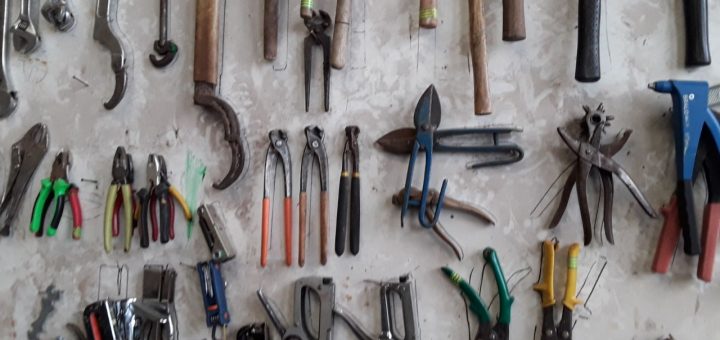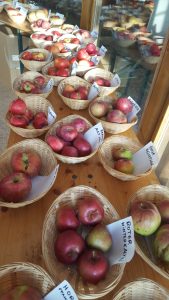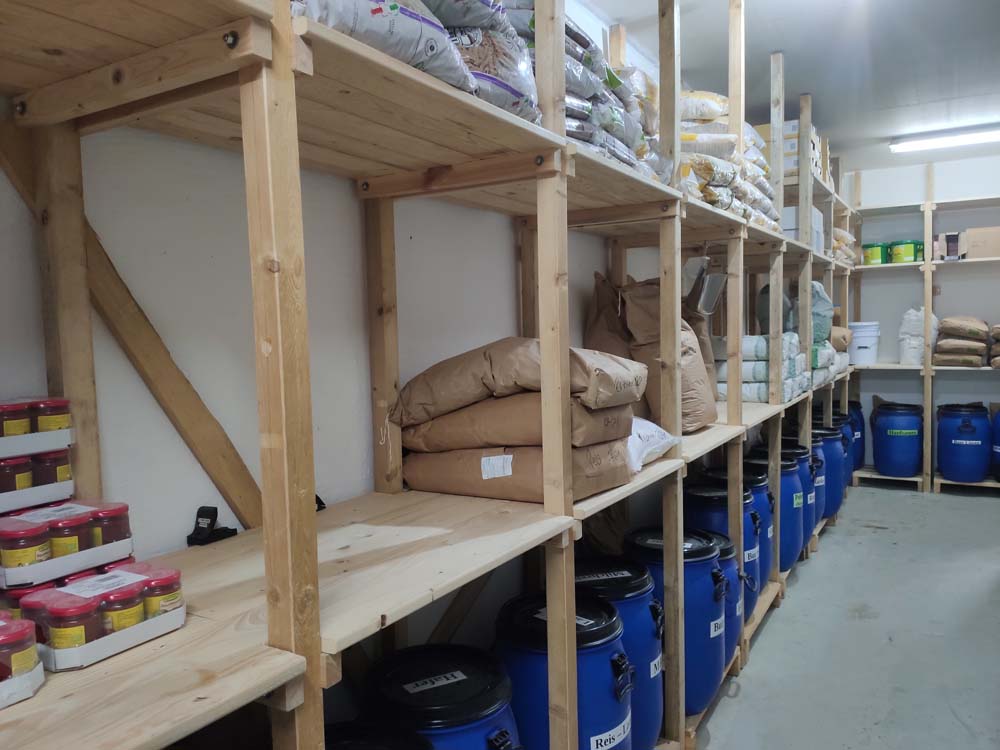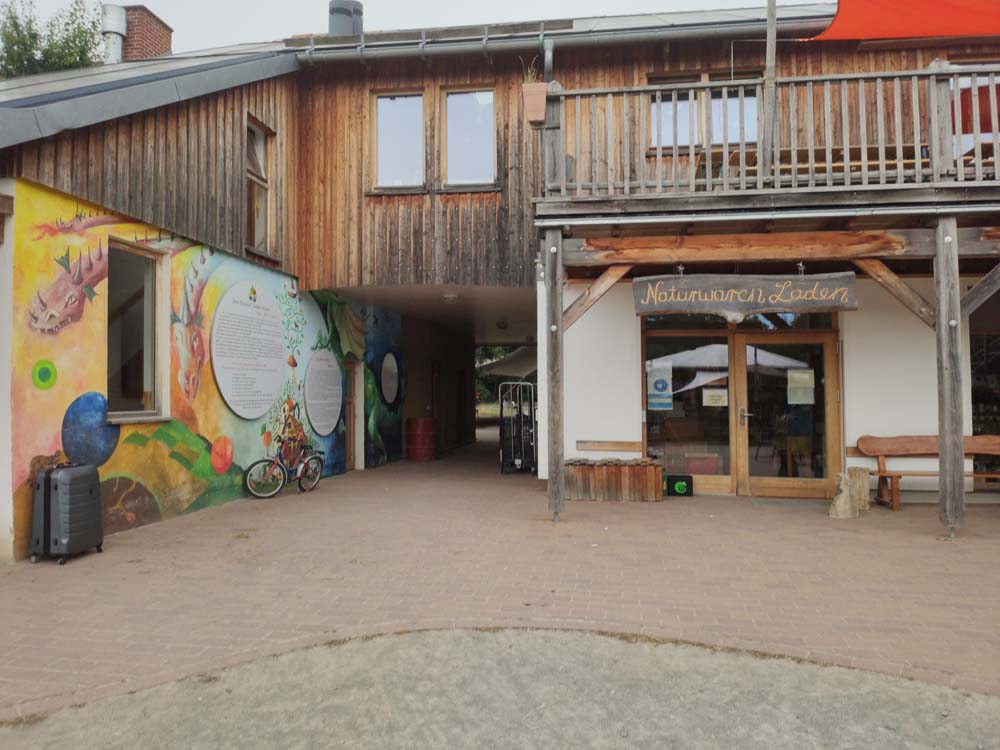
Economy
Guarantee of equitable ownership of land and resources
An important objective for the Sieben Linden inhabitants was to create a fair and common economy: the land and main ecovillage infrastructures are collectively owned through a cooperative, called Siedlungsgenossenschaft Ökodorf eG (nicknamed SiGe). Every long-term member of the community is asked to subscribe to 11 shares of the cooperative, which represents 11.275€, thus each inhabitant is then co-owner of the ecovillage land. For the members with no possibility to pay this sum, solidarity solutions are also set-up. The SiGe daily ensures many different community tasks in the ecovillage: for its operating costs, every member monthly pays around 140 euros. All residential buildings are also equitably owned by the inhabitants: a housing cooperative called Wohnungsgenossenschaft Sieben Linden eG (nicknamed WoGe) have then provided the legal and financial framework for the construction of most of the housing projects. Thus, every resident has to bring to WoGe a financial share (12.000€) and working hours in order to build the house (all inhabitants have to participate to the construction of their buildings). The remaining sum of money needed to build the house is covered with additional deposits made by some of the residents or with credits established by WoGe. After being installed in their houses, the residents pay a monthly rent which depends on their initial financial and work participation. A few residential buildings have been built by using their own legal entity and are not bound to WoGe. Community solidarity is a key element in Sieben Linden. That’s the reason why these 2 cooperatives give the possibility to invest in solidarity shares for members who want to bring an additional financial contribution to the project: these participations are then used to cover the shares of members who cannot bring their initial participation.Promotion of social entrepreneurship
The community regularly supports some of the ecovillagers to create start- ups or independent occupations: several services can be offered (such as advice or working places) and, when necessary, loans can be proposed.
Thus, several community members have created their independent work (as yoga teacher, dance teacher or craftsperson for example) and different companies have been developed in the ecovillage, for example:
ups or independent occupations: several services can be offered (such as advice or working places) and, when necessary, loans can be proposed.
Thus, several community members have created their independent work (as yoga teacher, dance teacher or craftsperson for example) and different companies have been developed in the ecovillage, for example:
- the company Eurotopia edits and published every 4 years a directory of many of the European communities.
- Ugas Obstbaumschule is a tree nursery that cultivates several hundred kinds of old apple trees.
- the company Raw Living sends many raw aromatic herbs cultivated in the community to their German customers.
Wealth creation through sharing and collaboration
Creating a local collaborative economy
One of the pillars of Sieben Linden’s economy is to create closed loops with the money circulation in the community so as to strengthen the internal economy. Although every member is responsible for self-financing his own life, many different job opportunities are available within the community:- the SiGe cooperative needs employees to maintain forests and to farm the market-garden (see paragraph about “Guarantee of equitable ownership of land and resources” for more information)
- the WoGe cooperative employs people for its administrative tasks (see paragraph about “Guarantee of equitable ownership of land and resources” for more information)
- the organisation Freundeskreis Ökodorf eV is the charity which gathers all the Sieben Linden’s supporting members around its values. It organises many seminars related to sustainable development, ecovillage’s life and personal development. More than 20 ecovillagers work (mostly part-time) for this organisation to prepare the seminars proposed in the ecovillage.
- the company Naturwaren eV operates the grocery and organises the food provision: its aims are to provide the ecovillage with organic and, when available, local, fair and free from GMO products.
- the forest-kindergarten «Freie Schule Altmark eV» employs 3 educators.
Community service
A regular volunteer collaboration is asked to all the community: all members have to weekly do several hours of community services. Many different tasks can be performed as organising breakfasts, cleaning areas, preparing food… These activities are well organised in the community and are of great importance in the ecovillage life.Collective food sharing
One of the particularities of Sieben Linden is the creation of a dedicated kitty aimed at providing all essential products to the community in solidarity. The principle is simple: every member participates to the kitty in equal parts (around 7 euros per day and per person), that gives the right to take all the food and other essential products (such as cleaning products) that one can need. This food is available in a common storeroom and everybody can take any product with no restriction. The provision of the available products is made with strict requirements by a dedicated team: most of the vegetables come directly from the ecovillage market garden and are ecological. All other products are also ecological and, when possible, provided locally. Only essential products are available in the storeroom: some of the products considered as “comfort” products (like chocolate) are not available in the storeroom but can be bought in the grocer’s shop located in the ecovillage. This kitty creates a really strong feeling of community life, as everybody participates to the purchase of all the essential products regardless of the cost and the quantities taken by each community member. It also enables to reduce the waste incurred by the provision of products. Indeed, all products are available unpackaged: everybody can take the exact quantities of products needed, which reduces the leftovers. Moreover, it limits the quantity of package as everybody can come with its own reusable packages. All meals can be equally taken at home or in the community canteen (in that case, an extra should be paid to compensate the meal preparation, and extra-hours need to be worked): when some more privacy is needed, the residents can then prepare their own food and take their meal at home. They can also directly come to the canteen and take their meals with the community. The food for children is financially supported by all the community members. Similarly, all the costs for using the common infrastructures are not paid by the children’s parents but are divided between all the adult residents.
The storeroom where all community members can take the food they need
Support of local economies
The community, through its consumption, intends to support surrounding firms: that is the case with the bread bought by the community. All the bread consumed in the ecovillage comes from a close bakery. This bakery is the only one providing bread produced from ecological ingredients in the region: it was then important for the community to support this bakery instead of producing its own bread.Responsible production, consumption and trade
A shop has been installed on site in order to provide the extra-groceries for all residents and guests that are not part of the kitty. The shop is a public organic shop which also sells Sieben Linden-made products. All residents of the community are members of the shop: they pay a fixed membership fee and then get a general discount for their purchase. For all community members, the shop is used to provide themselves with the products they cannot find in the common storeroom, where they normally take their food.
The grocery enables the community members and their guests to buy the extra products.
